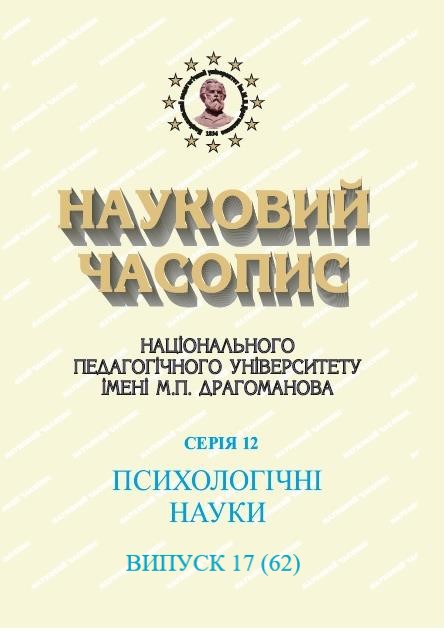EXPERIENCES OF THE FEELING OF FORCED SOCIAL ISOLATION BY PARTICIPANTS OF THE REHABILITATION PROCESS DURING THE COVID-19 PANDEMIC
DOI:
https://doi.org/10.31392/NPU-nc.series12.2022.17(62).04Keywords:
social and psychological rehabilitation of children, forced isolation, deprivation, pandemic, mental trauma.Abstract
The article is devoted to the practical analysis of the specifics of emotional state of children in social and psychological rehabilitation centers while in social isolation caused by the COVID-19 pandemic, and to the detection of effective psychological tools to stabilize their psycho-emotional state. Research methods: content analysis of audio recordings of counseling and supervision sessions with the tutors who work at the centers of social and psychological rehabilitation for children living there 24/7.It was established that during the first stage of the quarantine tutors experienced sudden restrictions of the usual way of living and felt frustration that expressed itself in the form of dissociations and fast exhaustion. All age groups of children experienced the revival of emotional state during vacations. Independence and cohesion among the teenaged audience increased. Forced closeness strengthened symbiotic ties in the team and focused attention on each other, but at the same time, toxic relationships of an unspecified format progressed. The children's sense of security began to stabilize and their trust started deepening.The adaptive stage of the quarantine was marked with a partial restoration of social contacts. The general euphoria that children felt was replaced with the fear of the unknown future. There were shifts between anger and depression, self-aggression was counterbalanced by thefts. The protective mechanisms of displacement, idealization, rationalization, and sublimation dominated. Aggression towards each other progressed.The third stage, resocial, is influenced by hopes for a quick return to normal life. Due to the lack of “useful emotions” teenagers became open to taking risks. Some days their reactions might be full of negativity and impulsiveness without an effect of chain contamination and with the control of this group of emotions. The nature of such aggression is due to the lack of motivation for relationships, rather than due to the fear of death.It was established that the experience of forced social isolation during the COVID-19 pandemic had no global destructive consequences on the rehabilitation of children. Children had the opportunity to establish trusting relationships with adults, to gain joint experience of overcoming difficulties and to strengthen their psycho-emotional state.
References
- Baujer, I. (2009). Pochemu ja chuvstvuju, chto chuvstvuesh ty. Intuitivnaja kommunikacija i sekret zerkalnyh nejronov [I’ll hear you, that’s what I’m hearing. Intuitative communication and secretion of mirror neurons]. Saint Petersburg : ID Vernera Regena [in Russian].
- Bahareva, K. (2009). Psihologicheskaja reabilitacija v detskom vozraste [Psychological rehabilitation in childhood]. Rostov na Donu : Feniks [in Russian].
- Brish, K.H. (2012). Terapija narushenij privjazannosti: Ot teorii k praktike [Therapy of attachment disorders: From theory to practice]. (I. Dubinska, Trans.). Moscow : Kogito-Centr [in Russian].
- Hrydkovets, L.M., & Vasheka, T.V. (2015). Psykholohichne konsultuvannia [Psychological counseling]. Kyiv : Litera [in Ukrainian].
- Horbunova, V.V., Karachevskyi, A.B., Klymchuk, V.O., Netliukh, H.S., & Romanchuk, O.I. (2016). Sotsialno-psykholohichna pidtrymka adaptatsii veteraniv ATO [Social and psychological support for the adaptation of anti-terrorist operation veterans]. Lviv : Instytut psykhichnoho zdorovia Ukrainskoho katolytskoho universytetu [in Ukrainian].
- Klymchuk, V., Moskvina, N., & Prianichnikova, O. (2014). Dity i viina: navchannia tekhnik ztsilennia [Children and war: learning healing techniques]. Lviv : Vyd-vo. Instytutu psykhichnoho zdorovia. Recived from http://ipz.org.ua/wp-content/uploads/2017/
10/dity_fin_ispp-1.pdf [in Ukrainian]. - Kaljuzhnova, I. (2013). Reabilitacija posle psihologicheskoj travmy [Rehabilitation after psychological trauma]. Moscow : Nauchnaja kniga [in Russian].
- Nikolskaja, I.M., & Granovskaja, R.M. (2010). Psihologicheskaja zashhita u detej [Psychological protection in children]. Saint Petersburg : Rech [in Russian].
- Tsarenko, L. (2018). Osnovy reabilitatsiinoi psykholohii: podolannia naslidkiv kryzy [Fundamentals of rehabilitation psychology: overcoming the effects of the crisis]. In L.Tsarenko (Ed.). (Tom 2). Kyiv : OBSIe [in Ukrainian].
- Hrydkovets, L. (2018). Osnovy reabilitatsiinoi psykholohii: podolannia naslidkiv kryzy [Fundamentals of rehabilitation psychology: overcoming the effects of the crisis.]. In L. Hrydkovets (Ed). (Tom 3). Kyiv : OBSIe [in Ukrainian].
- Pysaryk, O. (2011). Pryviazanist – zhyttievo-vazhlyvyi zviazok [Attachment is a vital connection]. Zbirka statei, shcho napysani na osnovi kursu Hordona Niufelda «Zhyttievyi zviazok» (Gordon Neufeld. The Vital Connection) – Acollection of articles based on Gordon Neufeld's course “Vital Connection”. Recived from https://sirotstvy.net/upload/iblock/995/
pdf [in Ukrainian]. - Riccolatti, Dzh., & Sinigalja, K. (2012). Zerkala v mozge: O mehanizmah sovmestnogo dejstvija i soperezhivanija [Mirrors in the brain: On the mechanisms of joint action and empathy]. Moscow : Jazyki slavjanskih kultur [in Russian].
- Spivakovskaja, A.S. (1988). Profilaktika detskih nevrozov (kompleksnaja psihologicheskaja korrekcija) [Prevention of childhood neuroses (comprehensive psychological correction)]. Moscow : Izd-vo MGU [in Russian].
- Trubicyna, L.V. (2005). Process travmy [The process of injury]. Moscow: Smysl; CheRo [in Russian].
- Oswald, H.S., Heil, K., & Goldbeck, L. (2010). History of Maltreatment and Mental Health Problems in Foster Children: A Review of the Literature. Journal of Pediatric Psychology, 35(5), (pp. 462–472). https://doi.org/10.1093/jpepsy/jsp114

